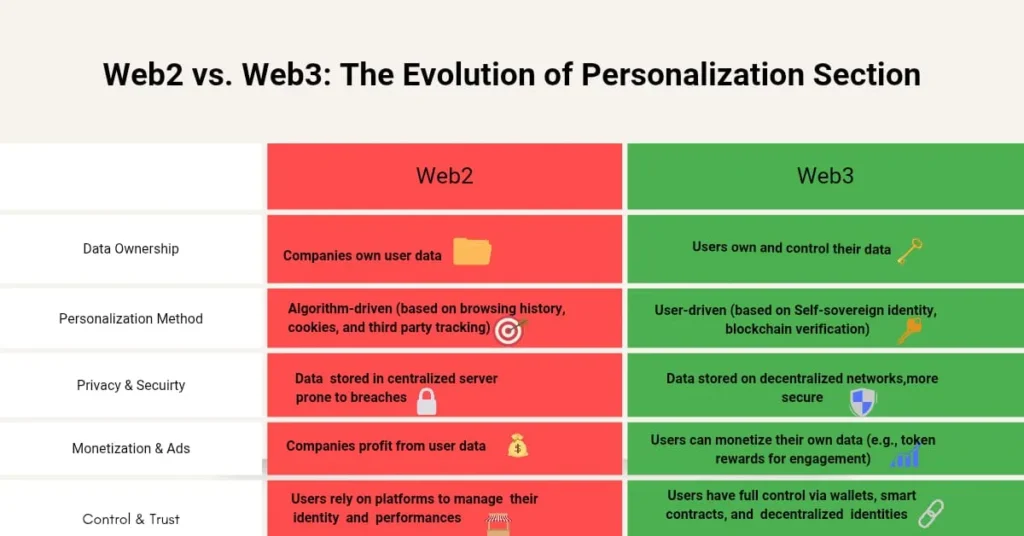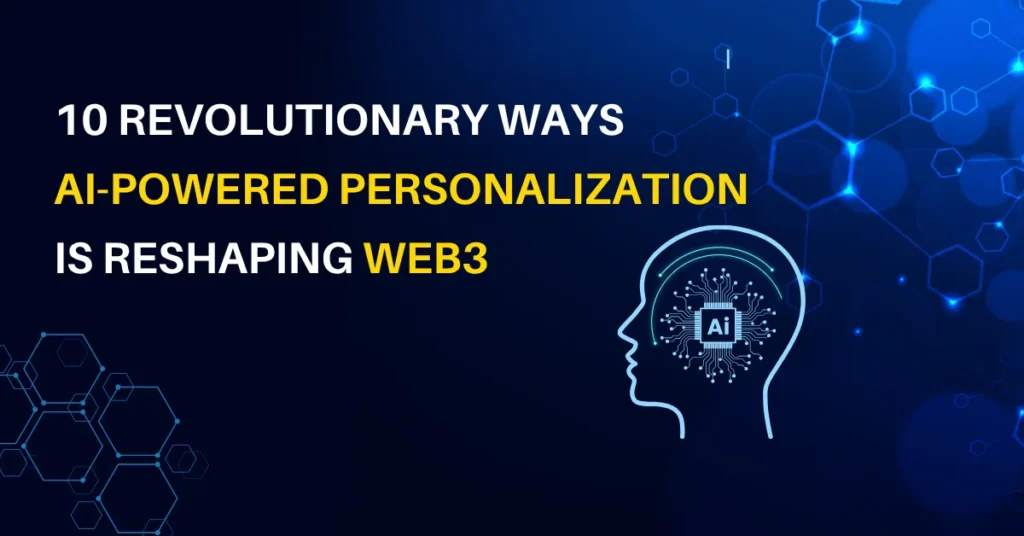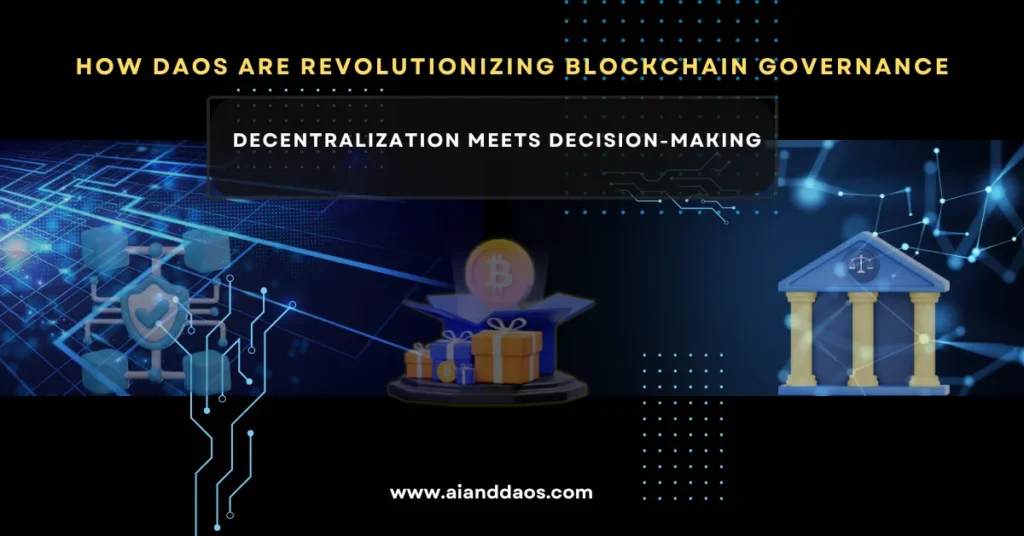How AI-Powered Personalization in Web3 Balances Privacy
Imagine an internet that gives you a personal experience without spying on you.
No more websites tracking everything you do. No more big companies collecting your data.
That’s what Web3 promises — and it’s powered by something called AI-powered personalization.
Right now, in Web2 (the current internet), personalization comes with a price: your privacy.
Companies like Google and Meta use your data to make things feel personal — but they also make money from it. You lose control over your own information.
Web3 is changing that.
It combines AI with tools like blockchain, digital wallets, and privacy tech to give you smart, helpful experiences — without stealing your data.
AI in Web3 looks at your on-chain activity (what you do in blockchain apps) and learns from it — safely.
That means you get content and suggestions that fit you, but your personal info stays private.
And with more than 80% of people now expecting personalization online, Web3 shows we can have it — without giving up our privacy.
AI in Web3 Marketing: How Hyper-Personalization is Changing the Game.
How AI is Revolutionizing Web3 Marketing
In the world of Web3, marketing is changing — and AI is leading that change.
Before, companies used to show the same ads to everyone or followed you around online by tracking your clicks. But in Web3, that kind of spying isn’t allowed — people own their data.
So, how do brands still reach the right audience?
Here’s where AI helps:
It looks at public blockchain activity (like wallet transactions or what kind of NFTs someone owns) — not your private data. From that, it understands what someone might be interested in. For example, if your wallet shows a history of buying art NFTs, AI knows to show you similar creative products.
It also helps companies:
- Send smarter messages (not random spam)
- Create ads or content that fits each person
- Run NFT campaigns that change based on user behavior
And the best part?
It does all this without stealing or selling your personal info.
So, AI in Web3 marketing means more useful content for you, and better ways for businesses to connect — all while respecting your privacy.

Web2 vs. Web3 Personalization
In Web2, personalization emerges from proprietary systems, such as Google and Meta, that watch user activity using cookies, third-party data, and hidden algorithms. This framework is extraction-oriented and poses numerous vulnerabilities to privacy.
In comparison, AI and blockchain technologies fuel Web3 personalization. A trustless and decentralized approach guarantees privacy protection. Rather than surveilling users through centralized systems, Web3 exploits decentralized identity (DID), on-chain data, and AI smart contracts for content delivery, enabling extraordinary levels of personalization while maintaining complete privacy.
How AI Enhances Personalization in Web3
In Web3, AI is transforming digital interactions through:
👉 Decentralized AI Chatbots – Bots utilizing AI algorithms personalized to users’ permanent identifiers (DID) deliver interaction without centralized observation, offering greater privacy.
👉 Machine Learning + Smart Contracts – Using machine learning models, AI manages content delivery at user’s engagement through smart contracts, giving pertinent suggestions securely.
👉 Zero-Knowledge Proofs (ZKPs) – Users’ preferences can be verified through AI without exposing private data. Personalization is implemented without revealing identity.
AI is also changing the governance models of DAOs by allowing automated governance decision processes. For more ideas on how AI optimizes governance, read our guide on How to Implement AI in DAOs: The Future of Smart Governance & Automation.
In the same manner, AI changes the Decentralized Finance (DeFi) markets enabling better fraud detection, risk assessment, and financial service personalization. Read more in AI in DeFi: How Artificial Intelligence is Redefining Decentralized Finance.
Web3 is currently transforming marketing through integrated strategies involving AI, non-fungible tokens (NFTs), decentralized verifiable credentials, and trust-enabled methods that enhance privacy and power control to users.
Real-World Examples of AI-Powered Personalization in Web3
As AI and blockchain grow together, some Web3 projects are leading the way in creating smarter, more personalized experiences. These platforms use AI to understand user behavior, integrate with blockchain for security, and offer rewards through tokens — all while protecting your privacy.
Lens Protocol – AI-Curated Decentralized Social Feeds
Lens Protocol is a Web3 social app that uses AI to suggest content and people you might like — not by spying on your personal data, but by understanding your activity on the blockchain. Instead of being tracked like on traditional platforms, you get smart, personalized suggestions based on what you do. Best of all, you stay in control. You fully own your profile and decide what you see.
Top 10 AI Tools for Web3 Content Creation in 2025.
CyberConnect – AI-Driven User Engagement Without Centralization
CyberConnect is a Web3 social platform that uses AI to personalize your feed — without invading your privacy.
Instead of tracking you like traditional apps, it looks at your on-chain activity and interactions to suggest content you’ll enjoy. You get a smarter, more private social experience.
Engagement Booster: Case Study – Lens Protocol’s AI Impact
Lens Protocol shows how AI in Web3 can boost user engagement without sacrificing privacy. By analyzing users’ on-chain activity (like what they follow or interact with), Lens delivers personalized content that feels relevant — without needing personal data. The result? Users spend more time exploring, connecting, and engaging.
✅ +40% engagement from AI-tailored content
✅ Zero surveillance – everything runs on-chain
✅ More user trust thanks to privacy-first personalization
Top AI Tools for Web3 Personalization
To personalize experiences in Web3, creators and developers are turning to powerful AI tools. Here are some of the top solutions:
- Altered State Machine (ASM) – AI agents that can learn and evolve within decentralized apps and games.
- Fetch.ai – AI-powered autonomous agents for smart contracts and DeFi workflows.
- Ocean Protocol – Enables AI models to access decentralized data marketplaces securely.
- The Graph – Indexing protocol that powers personalized dApp experiences using AI-enhanced queries.
- NEAR Protocol + AI Integrations – Web3 developer tools with support for AI personalization logic.
- DALL·E & ChatGPT APIs – Power dynamic content, user responses, and avatar generation in decentralized platforms.
These tools are helping creators deliver tailored, intelligent experiences that adapt to user behavior, preferences, and on-chain interactions.
The Role of NFTs & AI in Personalization
AI is making NFTs smarter and more useful. Instead of just being digital pictures, they can now change and respond to what you do. This means your NFT can show your interests or rewards — without giving up your privacy or using big tech companies.
AI-Driven Dynamic NFTs: Personalization in Action
Dynamic NFTs are like smart digital cards that can change over time. With AI, these NFTs can update based on what you do — like your achievements, activity, or preferences.
✅ Earned a reward? Your NFT updates.
✅ Changed your interest? Your NFT reflects that.
✅ All powered by AI — without giving away your personal data.
It’s personalization that evolves with you!
Discover 10 Top DAO Projects to Watch in 2025—many integrate AI-driven governance and NFT personalization.
AI-Powered NFT Marketplaces: Smarter Recommendations Without Tracking
In traditional marketplaces, recommendations often come from tracking your every move — cookies, clicks, and personal data. But in Web3, things work differently.
AI-powered NFT marketplaces use on-chain activity — like what NFTs you browse, buy, or interact with — to understand your interests. This allows them to offer smart, personalized suggestions without needing your private data.
✅ No tracking, no spying — just smart recommendations
✅ Based on your blockchain activity, not cookies
✅ You stay in control of your experience and data
It’s a smarter, privacy-first way to discover NFTs you’ll actually care about.
How Creator DAOs Will Revolutionize the Creator Economy in 2025
AI-Powered Reputation Systems for Web3 Marketing
One of Web3’s biggest challenges is knowing who to trust without using centralized platforms. AI is solving this by using blockchain data, reputation tokens, and privacy-focused tools to build smarter, more reliable marketing systems.
Soulbound Tokens (SBTs) & AI: The Future of Reputation in Web3
Soulbound Tokens are NFTs that can’t be transferred. They represent a user’s credentials, reputation, or achievements. AI can use them to:
Reward loyal users with personalized perks or greater voting power
Identify high-value users for exclusive offers, airdrops, or access to private communities
Detect fake accounts in DAOs by checking real voting history
AI + On-Chain Behavior Scoring
AI can analyze wallet activity to understand how engaged someone is, without needing personal information. It helps:
Recommend content that matches real user behavior
Spot active users based on NFT trades, DAO activity, or DeFi participation
Filter out spam and fake accounts
AI + Zero-Knowledge Proofs (ZKPs) for Privacy-First Personalization
Web3 users want privacy. With ZKPs and AI, platforms can deliver personalization without needing to know sensitive personal details. This makes it possible to:
Personalize experiences while protecting user privacy
Confirm someone’s reputation without exposing their identity
Allow real users to receive airdrops, NFT rewards, and exclusive content.
The Future of AI in Web3 Marketing
As AI-powered personalization becomes a core component of Web3, it is reshaping marketing, governance, and user engagement in decentralized ecosystems. The shift from centralized data control to trustless AI-driven personalization presents exciting opportunities—but also ethical challenges.
AI Agents in DAOs: Personalized Community Engagement
DAOs are redefining how communities operate, and AI is playing a crucial role in improving engagement and decision-making.
✅ Personalized Content Delivery: AI analyzes on-chain activity and past governance participation to send relevant proposals, educational content, and engagement incentives to DAO members.
✅ Automated Governance Insights: AI can highlight key governance proposals based on a member’s interests and predict proposal outcomes using historical voting data.
✅ Tailored Perks & Rewards: AI-driven DAOs can automatically distribute governance tokens, NFTs, and staking rewards based on user behavior.
Learn more in How AI in DAOs is Transforming Governance: Benefits, Risks, and the Future —exploring AI-driven governance models and their marketing applications.
Decentralized AI Marketplaces: Breaking Free from Big Tech
In Web2, AI personalization is dominated by centralized companies like Google and Meta, which collect user data to optimize engagement. Web3 flips this model by introducing decentralized AI-powered marketplaces that offer personalization without mass surveillance.
AI without Centralized Control: Instead of relying on Big Tech, Web3-native AI solutions run on blockchain networks and use decentralized storage to maintain data privacy.
Tokenized AI Services: Users can access AI-powered marketing, content recommendations, and analytics via token-based access models, ensuring a more equitable AI economy.
Privacy-Preserving AI Models: Zero-knowledge proofs (ZKPs) and decentralized AI allow Web3 brands to deliver customized experiences without exposing sensitive data.
Example: A decentralized AI-powered ad network that matches brands with the right Web3 audiences based on on-chain activity rather than personal browsing history.
Ethical Challenges & Privacy Concerns
As AI takes a larger role in Web3 marketing, it introduces new ethical dilemmas and risks that need to be addressed.
AI Bias & Fairness: AI models can reinforce biases present in training data. How can Web3 ensure AI-driven personalization remains fair and inclusive?
Data Security & Sovereignty: While Web3 prioritizes privacy, AI still requires some level of data processing. How do we balance personalization with decentralization?
AI & Manipulation Risks: In Web2, AI algorithms prioritize engagement over well-being. Web3 marketers need transparent AI models that avoid manipulative tactics.
Potential Solution: Web3 communities could create DAO-governed AI models, where members vote on ethical AI guidelines and transparency standards for AI-powered personalization.
The Road Ahead: AI & Web3 Marketing Will Evolve Together
AI-powered personalization in Web3 is still in its early stages, but as decentralized AI, trustless reputation systems, and privacy-first models mature, we are heading toward a marketing landscape free from centralized surveillance and data exploitation.
How Businesses & Creators Can Leverage AI-Powered Personalization in Web3
Let’s say you’re a content creator, artist, or business owner in Web3. You want to give your audience a personal experience — like recommending the right content, NFTs, or rewards — but you don’t want to collect their private data.
Here’s how AI-powered personalization in Web3 helps you do that:
1. Look at on-chain behavior (not private data)
In Web3, everything a user does (like buying an NFT or joining a DAO) is recorded publicly on the blockchain. AI can read this public data and learn what the user is interested in — without needing their name, email, or location.
2. Use AI to suggest the right things
Let’s say a user has collected a few music NFTs. AI can help you recommend similar songs, artists, or drops. If they’re active in gaming, you might show them Web3 game items or communities.
3. Reward your true fans
AI can also help you spot who engages the most — and you can reward them with discounts, early access, or exclusive tokens. Since this is based on blockchain activity, it’s fair and transparent.
4. No spying, no tracking
Unlike Web2 (where platforms watch everything you do), this kind of personalization respects the user. You’re offering value based on what they’ve chosen to share publicly — not by following them around online.
FAQs: AI-Powered Personalization in Web3
1. What is AI-powered personalization in Web3?
AI-powered personalization in Web3 refers to the use of artificial intelligence to create customized user experiences while maintaining decentralization and privacy. Unlike Web2, which relies on cookies and third-party tracking, Web3 uses AI with blockchain data, smart contracts, and decentralized identities to deliver tailored content and recommendations.
2. How does AI improve personalization without tracking in Web3?
AI in Web3 leverages on-chain data, decentralized identity solutions, and zero-knowledge proofs (ZKPs) to personalize experiences without violating privacy. Instead of storing user data in centralized servers, AI analyzes wallet transactions, NFT ownership, and DAO participation to provide relevant suggestions without invasive tracking.
3. What are the benefits of AI-driven personalization in Web3?
- Privacy-first personalization without centralized control.
- Better user engagement through AI-curated feeds and recommendations.
- Trustless AI models ensuring secure and transparent interactions.
- Tokenized incentives allowing users to monetize their data.
4. How do decentralized AI models personalize content?
Decentralized AI models analyze on-chain behavior, wallet activity, and smart contract interactions to create customized content feeds, governance recommendations, and NFT suggestions—without relying on third-party trackers.
5. Can AI-powered personalization enhance DAO governance?
Yes! AI can improve DAO governance by:
- Automating proposal recommendations based on voting history.
- Identifying active contributors for rewards.
- Using AI chatbots to facilitate community engagement.
6. What role do AI-powered NFTs play in Web3 personalization?
AI-powered dynamic NFTs evolve based on user interactions, such as community participation, voting in DAOs, or engagement with decentralized apps. This allows for more interactive and personalized NFT experiences.
7. How do AI-driven reputation systems work in Web3?
AI-powered reputation systems use soulbound tokens (SBTs), on-chain scoring, and zero-knowledge proofs to verify user credibility without exposing personal data. This enables trust-building in decentralized networks.
8. Are there real-world examples of AI-powered personalization in Web3?
Yes! Some top examples include:
- Lens Protocol – AI-powered decentralized social feeds.
- CyberConnect – AI-driven engagement based on blockchain interactions.
- Nansen AI – Wallet analytics for personalized insights.
9. How does AI impact Web3 marketing?
AI enhances Web3 marketing by delivering hyper-personalized experiences through:
- AI-curated NFT marketplaces.
- AI-powered DeFi investment suggestions.
- Decentralized AI chatbots for Web3 brands.
10. Will AI replace human-driven personalization in Web3?
AI won’t fully replace human creativity but will augment Web3 experiences by automating personalization while ensuring privacy, trust, and decentralization. By 2030, over 50% of Web3 content may be AI-personalized without intrusive tracking!
Final Thoughts: The AI-Powered Web3 Revolution
AI-powered personalization is redefining how we interact with the internet. Unlike traditional Web2 systems that rely on tracking and data extraction, Web3 empowers users to enjoy smart, customized experiences — without sacrificing privacy.
From NFTs and DAOs to social platforms and tokenized assets, AI-powered personalization ensures your online journey feels relevant and intuitive, while keeping you in control of your data. It’s personalization with transparency, built on decentralization and trust.
As we move forward, AI-powered personalization in Web3 isn’t just a trend — it’s a transformative shift. It’s shaping a future where technology truly serves the individual, not the other way around.



Pingback: AI for Content Creation in DAOs & Blockchain